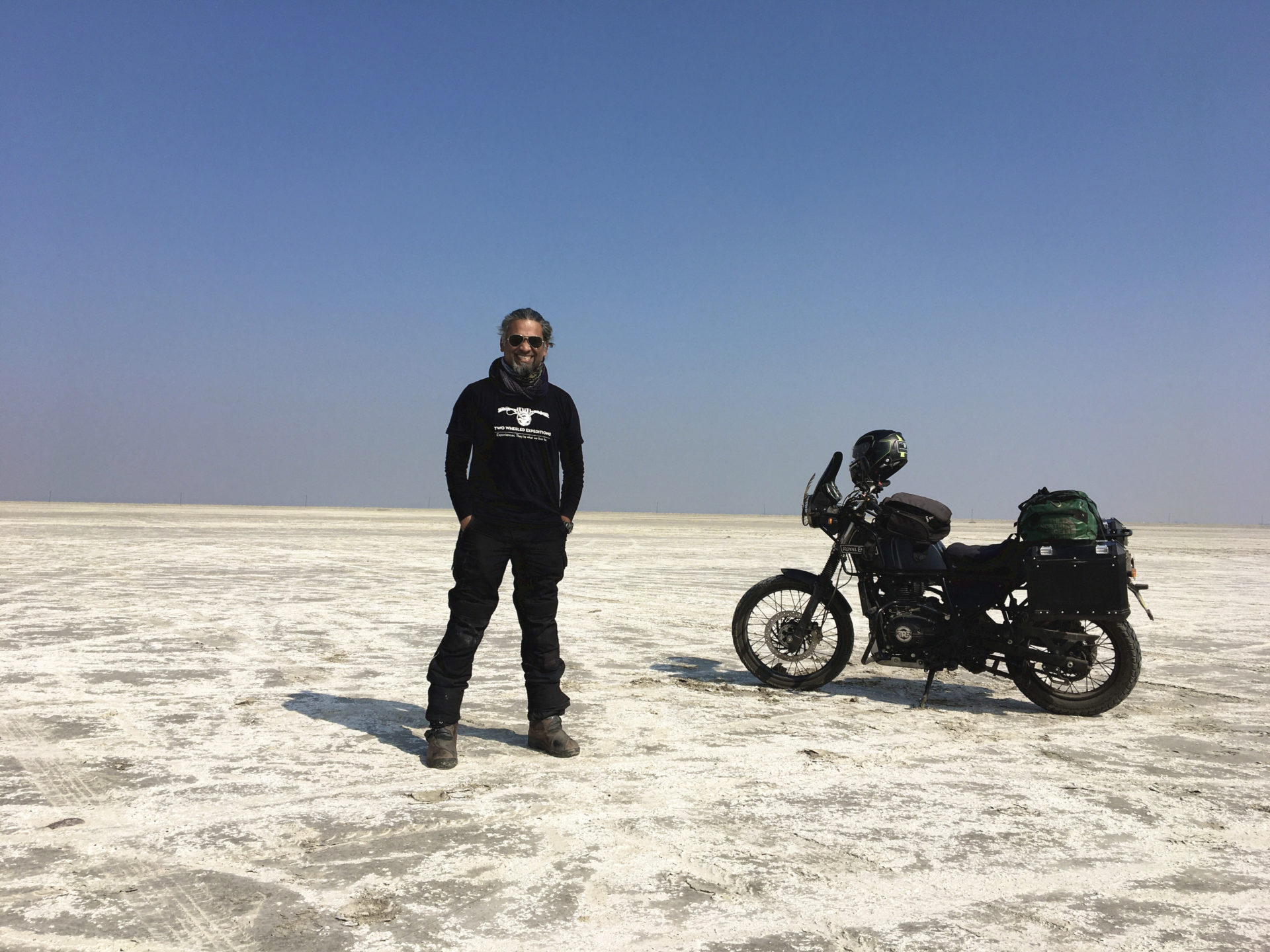Rajasthan – A Roadside Meditation

I know I have ridden far from the highway when at the tea stops, the cups shrink to under two inches and the horizon seems endless. So when I pull up beside a bright blue shop under a Khejri tree, the official state tree of Rajasthan, I order not one, but two cups of chai.
The bench I sit on lets me lean against the brick wall of a government school to watch life go by on the hard packed dirt road. Kids in uniform and masks seem in no hurry even though it’s well past their morning assembly. Post lockdown there must be marks for just showing up.
A diesel goods train rumbles by the railway crossing barely fifty meters from where I am sitting. As the yellow and black stripped barricade goes up, a bullock cart leisurely rolls across with a man and woman sitting cross legged beside each other. She uses the loose end of her pink sari to cover her face, known as “ghoonghat”, a common practice among married women in these parts.
I get back up to order more chai and smell the incense burning below the framed picture of a local deity. The spice-induced tea concoction brewing in the wood fire makes it a heady smokey mix. The shopkeeper acknowledges my order by nodding his head and showing his index finger, implying that it will be ready in a minute.

Tea in Rajasthan
Standing beside me is the sole customer. A man in local attire of cotton dhoti-kurta and a bright turban. He is lighting his rolled-up cigarette known as ‘bidi’ and curiously looking at my bike. He seems unsure about me and to be fair I do look odd in my bulky dust covered riding gear.
Taking my sunglasses off, I smile and greet him with a “Namaste”. A little at ease, he shoots the standard questions I get asked in most of rural India. Where are you from? How much is your bike? What average kms to a liter does the bike give?

Chai stop in Rajasthan
One isn’t expected to literally answer such questions. I mention where my parents are from, not where I grew up or where I am currently living. And I don’t mention the on-road price of a Royal Enfield motorcycle, I say it is worth three camels.
Our chai arrives and we talk a bit more about local and national news, the lockdown and its impact. The pandemic gives us a common ground to acknowledge the fragility of life, even empathize with one another, and imagine what the new season could bring.
As I ready myself to resume my ride, this ritual makes passersby stop and stare at me pulling down the helmet, putting on the winter gloves and then awkwardly getting on the bike. As I ride off, I hear the man with whom I was conversing telling the bystanders “chalo, chalo, picture khatam ho gaya!” (move along people, show’s over!)
Our rides to the beautiful state of Rajasthan re-start on 24 October 2021. To check out the ride, click here.
Recent Stories
- I Can Do This! The Women of Two Wheeled Expeditions and how biking became their lives. November 13, 2024
- Cracking the Code on Covid Travel November 13, 2024
- Sri Lanka – The Perfect Adventure Motorcycling Destination November 13, 2024
- Sidecars..a source of pure joy November 13, 2024
- Is Klim’s Badlands Pro the best riding suit in the history of the universe? November 13, 2024
Related Topics
Expeditions
Recent Posts
Recent Comments
Archives
Categories
- Adventure Motorcycling
- Adventure Travel
- Africa Twin
- Bhutan
- Bikaner
- Bike Reviews
- BMW Motorrad
- dirt biking
- Honda
- India Motorcycling
- Kerala
- KTM
- Ladakh
- Lady Bikers
- Lady Bikers
- motorcycling skills
- Nepal
- Nepal Motorcycling
- Rajasthan
- Royal Enfield
- Sri Lanka
- Uncategorized
- Vintage Motorcycles
- Vintage Motorcycles
- Women Bikers
- Women Motorcyclist
- Women's Motorcycle Tours
Loved the story, Josh. It was quite like those from ‘Malgudi Days’ – short & simple, and yet one that gets you to reflect & appreciate the little joys life offers, which are easy to miss otherwise.